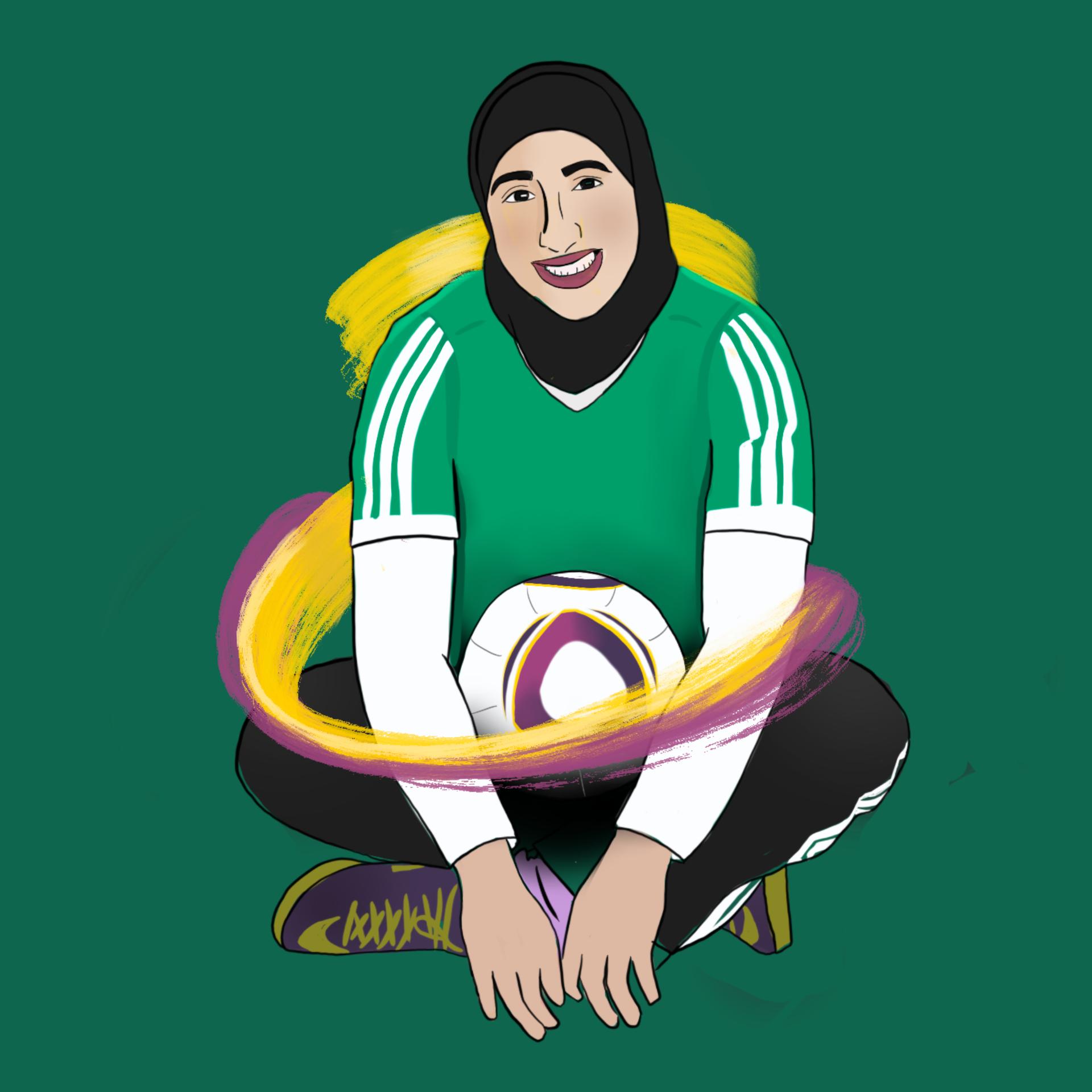Jessica Luther, Shireen Ahmed, Alex Wong and Morgan Campbell set out to highlight gender-based violence, religion, race and more in their work
By Joseph Casciaro
Illustrations by Therese Sevilla
There is more to sports than just stats, wins and championships. There are things in the sports industry that are bigger than sports themselves, like racism, sexism and ageism.
These issues, though important and rooted in the very fabric of sports, are underreported. The focus in the media is often on who’s winning or losing, rather than the underlying factors that contribute to the way we view the industry as a whole.
However, there are still some journalists who choose to focus their work around these cultural issues in sports, with the work of these dedicated journalists bringing crucial stories into the light. Stories like that of Colin Kaepernick and his views on the treatment of racial minorities in the United States or the sexual assault convictions of former USA Gymnastics doctor Larry Nassar are arguably two of the biggest stories in sports history.
Stories like that of Kaepernick and Nasser are the reasons why sports culture reporters are needed. They can be an outlet for minorities trying to get their voice out.
The Eyeopener wanted to shed light on some journalists that go beyond the stat sheet to help understand sports on a completely different societal level—and actually do it well. Journalists like Jessica Luther, Shireen Ahmed, Alex Wong and Morgan Campbell are using their own experiences and opinions to create a more inclusive environment in sports.
Jessica Luther
puts a spotlight on sexual and gender-based violence in sports and women athletes

Jessica Luther is a freelance journalist based in Austin, Texas, whose work has been featured in ESPN Magazine, Bleacher Report and Sports Illustrated. She is also one of the hosts of the Burn it All Down podcast, a high-profile feminist sports podcast.
Luther’s work mainly focuses on women and gender-based violence in sports. She wants to give women the attention they deserve—the attention that a lot of people try to take from them.
“I love writing about women in sports and all the stuff that they’re accomplishing despite often going up against those who don’t think they should be playing at all,” said Luther.
Luther famously broke the Baylor University sexual assault football story, alongside her co-worker, Dan Solomon. It’s a story that she is very proud of and helped establish a name for herself.
The original story was that Baylor tried to hide that their defensive end, Sam Ukwuachu, was due to stand trial for the sexual assault of a student athlete. Baylor never released that he was on trial and wanted to allow him to play. Ukwuachu was never disciplined by Baylor, in any way, while the charges were pending.
Despite the Baylor story being her biggest one yet, Luther’s favourite was when she covered Girls Travel Baseball, an all-girls baseball team that came together and competed in tournaments around the United States.
“They don’t really have time to practice together the way that the boys travel teams do,” said Luther. “And then they just compete in tournaments. These girls talk about just loving baseball so much and just wanting to play it.”
She also touched on the point that most of the girls she talked to knew they would eventually be pushed out of the sport.
Luther works hard as a journalist in order to focus on issues like sexual assault and gender-based violence. She also works to give women in sports the attention they deserve, and loves every second of her job.
“I was going [to France] to cover the Jamaican women’s soccer team. They were playing Italy and I was writing a piece for Huffington Post about Cedella Marley—Bob Marley’s daughter who basically bankrolled the team,” said Luther.
“You have moments like that where this is my job [to] be around and interviewing Jamaican fans and watching soccer. You know, being that close to the thing that I love.”
Shireen Ahmed
highlights Muslim women in sports and the intersection of race and gender

Shireen Ahmed is a freelance sports and politics writer. Ahmed prides herself on being a sports activist and is also one of the hosts of the Burn it All Down podcast, alongside Luther.
Ahmed reports on issues relating to Muslim women in sports and on the intersection of race and gender. She also focuses on oppression inflicted by people in positions of power.
She says that her personal experiences in the sports world help her relate to her own reporting on instances of racism. As a young person, Ahmed said she played on a soccer team and was made fun of by her opponents because of her Mehndi—also known as henna—on her hands.
According to Ahmed, Mehndi is a naturally occurring dye that women use for designs on their hands and feet in certain cultures. The henna is used to adorn themselves during weddings, parties, cultural and religious celebrations.
Henna was a part of Ahmed’s culture, but other girls on the soccer field said she had a disease and refused to even shake her hand after the game.
Ahmed wants to see a change in what sports journalism is based on the types of stories released to the media. She also looks for change in what is expected of the reporters writing stories in regards to basic game coverage and looking at the lives of athletes.
“[Sports culture] is not just one thing that should be looked at from a singular lens. I also want to unpack the idea of what a sportswriter looks like and who they can be,” said Ahmed.
Ahmed thinks the majority of the blame for toxic sports culture can be directed to the people in power in the sports world, like owners and general managers. They tend to look the other way when it comes to facing the issues which affect marginalized people.
“The systems of oppression within sports are held up by owners and federations, and by sports media who do not ask the right questions and may not have the tools to even think differently,” said Ahmed. “The status quo is dangerously subpar.”
Ahmed wants to go beyond sports and focus on issues of racism and sexism caused by people in power. Her goal is to expand coverage on race and gender in sports. She knows that women and people of different cultures are capable of using sports to leave their mark on the world.
“The biggest misconception of sports is that women’s sports are less exciting than men’s,” said Ahmed. “It’s a complete fallacy.”
Alex Wong
humanizes athletes with personal stories

Alex Wong is a Toronto journalist who has been featured in GQ, The New York Times and SLAM. He is in charge of covering the Toronto Raptors for Yahoo Sports Canada and is also a co-host of Yahoo’s Raptors show Run it Back.
For Wong, the stats are the least important part of sports—he tends to focus on the athletes and their own personal stories.
“For me, it’s all about interacting with these players as humans,” said Wong. “They don’t live the same lives as we do, but I think that shouldn’t deter reporters like myself from wanting to tell stories that humanize them in a way.”
Wong mainly focuses on the shift in sports culture toward a younger demographic—he knows the world is changing and works to interest younger people. He does this through social media. He also focuses on fashion reporting, like streetwear. One story he wrote centred on the Supreme brand and what athletes thought of it.
Wong said sports, like hockey or baseball, which refuse to cater to a younger demographic, can have their athletes labelled as boring.
“I think everyone has an interesting story,” said Wong. “If there’s an angle to a story about baseball players or hockey players that has a culture-driven slant, it can bring out a different side to these guys and the sport.”
He believes there’s a way to access these stories. If journalists step out of their comfort zones and try new things there can be more talk of culture in the sports world.
Wong believes if older journalists can adjust to new ways of reporting, they will be more open to asking less traditional questions. For Wong, it’s about helping other journalists understand that stories on sports culture can be interesting to readers too.
One story that Wong is proud of is a feature piece he wrote for The New York Times in 2017 in which he spoke to different sports anchors about adjusting to the social media world. The focus was to see how anchors keep things interesting since most sports news is released on social media in minutes. This leaves anchors with not much left to report on television.
Wong takes pride in writing stories most editors and other reporters would decline.
“Having the chance to talk to athletes and get their insight on stories is always an awesome opportunity that I don’t take for granted,” said Wong.
Morgan Campbell
calls out the favouritism of white athletes

Morgan Campbell is a reporter that focuses on the sports industry and the intersections of race and politics.
He worked at the Toronto Star for 18 years before he decided he wanted to move onto a new adventure a few months ago.
Some of his most memorable work about culture in sports was written at the Star. His stories on former NHL player Akim Aliu and NFL star Lamar Jackson.
Aliu was a Black hockey player that had two brief stints in the NHL from 2011-13. He faced discrimination from white coaches, inevitably losing his career due to prejudices in the league with his former coach, Bill Peters, using racial slurs toward him.
Lamar Jackson, on the other hand, lost millions of dollars due to general managers in the NFL preferring white quarterbacks over him, despite proving that he had much more skill. The managers showed their preference toward white quarterbacks because in Jackson’s draft, four white quarterbacks with much less skill were drafted before him.
Both stories focused on the preference toward the white players in the sports community, something that could not easily be changed due to the people in power.
“It doesn’t even matter if a decision-maker is incompetent,” Campbell said. “It doesn’t matter how good [Black athletes] are. This person could label you as unworthy and you have to fight against that the whole rest of your career. And that’s what has been up against me.”
He also spoke about an instance where he dealt with racism as a journalist. When he was just starting out in the year 2000, he covered the NHL beat and got to interview former Black NHL player, Anson Carter. He talked to Carter about things like race and how he portrays himself in a white-dominated sport.
A reporter from the National Post then went on to take a shot at how Campbell went about interviewing Carter in his byline the next day. The Post reporter wrote, “pressed by a minority reporter to comment on racism in the NHL, Carter said simply, ‘I’m not a politician. I’m a hockey player.’”
“That to me was journalistic malpractice because that was not how he answered questions about race and I was not pressing,” said Campbell. “[Carter] was happy to answer the questions. And why does it matter that I’m a minority reporter, except that he’s trying to signal to the audience, who belongs in this industry and who doesn’t?”
The impact he hopes to have on the sports world is quite simple: he wants to make his consistent followers a little bit smarter. And, if he can make them more literal in race-based issues and sports, he’s done his job.
While there is a lot of diversity in Toronto, there is little to none when it comes to the world of sports media, according to Campbell, as the majority of reporters are white men.
“If you have a diverse audience and a diverse group of people you cover, the people covering them should be diverse too,” said Campbell. “Instead, they all look one way.”
Though he faced many difficulties, Campbell never let anyone affect him and he continues to work hard for success.
“The thing about me is that just because someone tries to make me feel uncomfortable, it doesn’t mean I have to feel uncomfortable,” said Campbell. “I’ve never felt like I hadn’t earned a space in this industry.”













davidharper
Thanks for sharing your info. I truly appreciate your efforts and I am waiting for
your further post thanks once again.
jesica taylor
Thanks for sharing the blog it is a very important and interesting topic in which peoples are receiving great information and very helpful.
Deeper Sport
NIce.